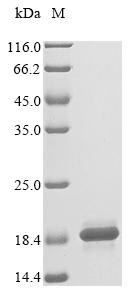Recombinant Human Cyclin-dependent kinases regulatory subunit 2 (CKS2) is expressed in E. coli, covering the full-length protein from amino acids 1 to 79. The protein carries an N-terminal 10xHis-tag and a C-terminal Myc-tag, which should help with purification and detection. SDS-PAGE analysis confirms the product shows purity greater than 90%, making it appropriate for various research applications.
CKS2 appears to be an integral component of the cell cycle. It plays what seems to be a crucial role in regulating cyclin-dependent kinases. Research suggests it's involved in cell cycle progression, and scientists have studied its interactions with other cell cycle proteins to better understand cell division mechanisms. This likely makes CKS2 a valuable protein for research in cellular regulation and cancer studies.
Potential Applications
Note: The applications listed below are based on what we know about this protein's biological functions, published research, and experience from experts in the field. However, we haven't fully tested all of these applications ourselves yet. We'd recommend running some preliminary tests first to make sure they work for your specific research goals.
1. Protein-Protein Interaction Studies Using Pull-Down
AssaysHuman CKS2 is a small, soluble protein that functions as a regulatory subunit for cyclin-dependent kinases. Its activity depends on correct folding to form the conserved "kip/cip" structure that mediates protein-protein interactions. The E. coli expression system can often successfully fold small, soluble eukaryotic proteins like CKS2. If correctly folded, the protein could identify physiological binding partners like CDK1 or CDK2. However, the dual N-terminal and C-terminal tags may potentially interfere with the protein's native structure and interaction interfaces, leading to false-negative results or non-specific (false-positive) binding. Interaction studies should be considered exploratory until validated with complementary approaches. While there's a reasonable probability of correct folding, the functional activity (particularly its ability to bind CDKs) cannot be guaranteed without experimental validation.
2. Antibody Development and Validation
This recombinant CKS2 serves as an excellent immunogen for generating specific antibodies. The full-length sequence ensures comprehensive epitope coverage, and the high purity minimizes antibodies against contaminants. While the tags may affect some conformational epitopes, they provide excellent handles for purification and screening during antibody development.
3. Biochemical Characterization and Stability Studies
This is the essential first step to assess protein quality and folding. Techniques like size-exclusion chromatography with multi-angle light scattering (SEC-MALS) can determine oligomeric state and homogeneity, while circular dichroism can analyze secondary structure content. These biophysical analyses directly address the folding uncertainty and provide the foundation for evaluating the protein's suitability for functional studies.
4. In Vitro Binding Assays and Competition Studies
This application is highly dependent on correct folding and tag positioning. If the protein is properly structured and the tags don't block binding interfaces, it could be used for quantitative binding studies with known partners like cyclin-CDK complexes. However, if misfolded or sterically hindered, binding data will be unreliable. Competition studies should only be attempted after confirming proper folding through Application 3 and validating basic binding activity with a positive control interaction.
Final Recommendation & Action Plan
The small size of CKS2 makes correct folding in E. coli plausible, but the dual-tag configuration introduces uncertainty about functional integrity. The immediate priority should be Application 3 (Biochemical Characterization) to validate proper folding and monodispersity through SEC-MALS and circular dichroism. If the protein shows correct structural properties, proceed to validate its binding capability with a known partner before attempting Applications 1 and 4. Application 2 (Antibody Development) can proceed immediately regardless of folding status. For critical functional studies, consider testing tag removal or using tag-free alternatives if initial binding validation fails. This systematic approach ensures reliable interpretation of experimental results.







